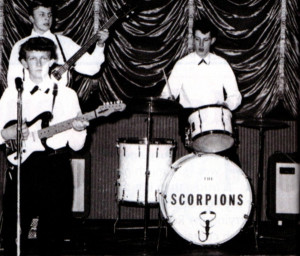
It was a good year for pop groups in 1963.
There were 25 groups in the city of Lincoln (although Liverpool had almost 300). At 17, my ambition was to be a rock drummer. 1 tossed four week’s wages (£24) in the direction of a silver pearl, secondhand drum kit. I use the word ‘kit’ loosely -this was merely four drums, with a rusting cymbal perched precariously on the end of a rickety stand.
After rehearsing with guitarist friends for a few weeks, I felt it was time to release our talents on an unsuspecting world. We knew of a pub called The Crown and Cushion, where the landlord was looking for someone to provide music at the weekend. We could have the use of an empty upstairs room in the pub to practice in, if we played for free on Friday and Saturday evenings.
We agreed, as finding a place to practice was always difficult for a group. We desperately needed somewhere. Anywhere. At least we would be performing before an audience.
The tiny pub was on a slip road that went under an industrial bridge, leading to the city centre. It was not an ideal location for attracting a large clientele. In fact, on our first night, the audience consisted of five old codgers who had little idea of what was awaiting them.
Unfortunately, a drum kit and Vox amplifiers were just too powerful for a small pub lounge. 1 put a towel over the snare drum to deaden the beat and borrowed a
cushion to put inside the base drum. But we still shook their beer glasses and rattled their dominoes.
My abiding memory of The Crown and Cushion is of practise sessions in the dingy upstairs attic room on bitterly cold December evenings, sucking Zubes cough sweets to keep ourselves warm. The room was completely bare, except for one five-amp electric socket, which we used for all our equipment. The white socket became a dark shade of brown by the time we had finished each rehearsal session.
After poring through a natural history book, we decided to call ourselves The Scorpions.
I spent an afternoon sticking lettering on my base drum, then I pasted on an elegant motif of a scorpion that one of the lads had created at his Lincoln Art School class a few days before.
Then we set about gathering a repertoire of songs. Radio stations, television shows and coffee bars were a good source of music material. Every coffee bar had an enormous jukebox, with magical names like Wurlitzer or Rock-Ola. One play cost 6d, or you could have three selections for a shilling. The rise of the coffee bar caused a load of old jukebox records to flood the market at bargain prices. The records were OK, if you didn’t mind the warping. On your turntable, the record went up and down like a fairground Waltzer. And there was a hole the size of a 50p coin in the middle.
Our bookings could be described as steady. We played mainly in working men’s clubs, where there would be 30 or 40 men of pension age, all wearing cloth caps. They just sat there looking bemused. I always felt we were an unwelcome intrusion into their conversations and their games of darts.
One memorable booking was in a small club above a shop in the High Street, next to Ruddocks bookshop. The owner said we could play on Friday lunchtime (for free), and if he liked us we would get a lucrative Saturday night booking. Needless to say, we never made the evening booking.
With hindsight, perhaps we should have re-named the group The Charities.
The best experience was playing at the Regal Cinema in front of 500 people. A local entrepreneur had come up with the idea of staging a contest to find the most talented group in Lincolnshire and Nottinghamshire. The competition was held over three evenings, with more than 40 outfits taking part. Each group was allotted ten minutes in which to play three numbers, vocal or instrumental, or a combination of the two. We chose a couple of Shadows numbers and the Chuck Berry vocal Sweet Little Sixteen.
Most of the groups were of a similar standard to us. But one outfit was truly outstanding. They wrote all their own material, possessed the finest equipment and their musicianship was unbelievable. I had heard of them by reputation, but had never seen them play before. They were a group of RAF lads from Scampton Air Base. They were fantastic and blew the rest of us clean out of the sky -despite the fact we had Brylcreemed hair, and sported black bow ties.
When the results were published, The Scorpions were listed in the upper half of the ratings. We even managed to get a mention in the local newspaper, The Lincolnshire Echo reporting: ‘The Scorpions have a fine lead guitarist, and the drummer must be one of the ablest in the competition’.
On the same page was a photo of our group in action. I went to the Echo offices and ordered a copy of the picture for posterity. I noticed in the photo, three of our four guitarists have their eyes fixated on their chords, while I have my mouth wide open, concentrating hard on my rhythms.
It was the closest I ever came to being famous.
Ralph Hill, Lincoln








